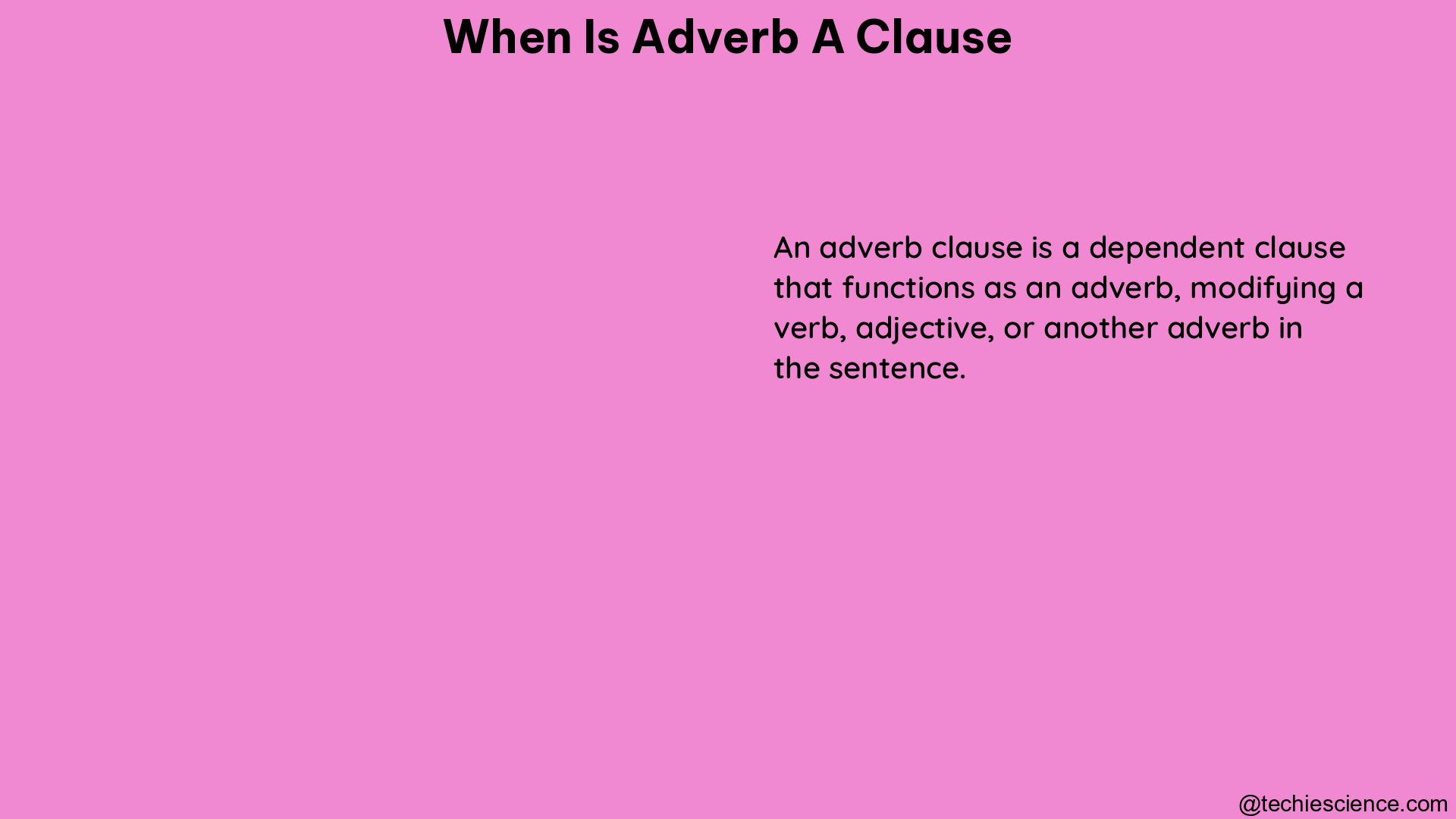An adverb is considered a clause when it forms a dependent clause that functions as an adverb in a sentence. This type of clause is called an adverbial clause or adverb clause, and it provides additional information about the main clause, such as time, place, condition, degree, or manner.
Definition and Function of Adverbial Clauses
What is an Adverbial Clause?
An adverbial clause is a dependent clause that modifies a verb, adjective, or another adverb in a sentence. It serves to provide more detailed information about the main clause, answering questions like “when?”, “where?”, “why?”, “how?”, or “under what conditions?”.
The Role of Adverbial Clauses
Adverbial clauses play a crucial role in enhancing the meaning and clarity of a sentence. They allow writers and speakers to convey more nuanced and specific information, adding depth and complexity to their communication.
Characteristics of Adverbial Clauses

Subordinating Conjunctions
Adverbial clauses are always introduced by a subordinating conjunction, such as “because”, “although”, “if”, “unless”, “until”, “whenever”, “where”, “as”, “since”, “while”, and many others. These conjunctions signal that the clause is dependent on the main clause and cannot stand alone as a complete sentence.
Dependent Clause Structure
Adverbial clauses are dependent clauses, meaning they cannot function independently as a complete sentence. They must be attached to a main clause to form a grammatically correct and meaningful sentence.
Placement in the Sentence
Adverbial clauses can appear at the beginning, middle, or end of a sentence, depending on the specific information they provide and the desired emphasis.
Types of Adverbial Clauses
Adverbial Clauses of Manner
These clauses describe how an action is performed, often using words like “as”, “like”, “the way”, or “however”. Example: As she had practiced in the mirror, the actress delivered her lines with confidence.
Adverbial Clauses of Place
These clauses indicate the location or setting of an action, often using words like “where”, “wherever”, or “anywhere”. Example: Where he eats lunch at school, the cafeteria is always crowded.
Adverbial Clauses of Condition
These clauses describe the circumstances under which an action will or will not occur, often using words like “if”, “unless”, “until”, or “provided that”. Example: Until they tell us to leave, we will continue to wait patiently.
Adverbial Clauses of Reason
These clauses explain the reason or cause for an action, often using words like “because”, “since”, “as”, or “due to the fact that”. Example: Because they are a bonded pair, the two dogs are never separated.
Adverbial Clauses of Time
These clauses indicate when an action takes place, often using words like “when”, “whenever”, “while”, “before”, “after”, or “as soon as”. Example: Before she got home, the dog had already finished his dinner.
Punctuation of Adverbial Clauses
Adverbial Clauses at the Beginning of a Sentence
When an adverbial clause appears at the beginning of a sentence, it is separated from the main clause with a comma. This helps to clearly distinguish the dependent clause from the independent clause.
Example: Because it snowed last night, we will not have school today.
Adverbial Clauses at the End of a Sentence
If the adverbial clause comes after the main clause, no comma is needed to separate the two.
Example: We will stay inside until it stops raining.
Conclusion
In summary, an adverb is considered a clause when it forms a dependent clause that functions as an adverb in a sentence. These adverbial clauses provide additional information about the main clause, such as time, place, condition, degree, or manner. They are characterized by starting with a subordinating conjunction and cannot stand alone as an independent sentence. Understanding the characteristics and types of adverbial clauses is crucial for effective and nuanced communication in the English language.
Reference:
– Purdue Online Writing Lab – Adverbial Clauses
– Grammar Monster – Adverbial Clauses
– The Writing Center at UNC-Chapel Hill – Subordinate Clauses

Hi…. I am Goutam Datta. I have completed a double M. A. in English and B. Ed. I am a creative writer. Currently, I am a part of the LambdaGeeks.